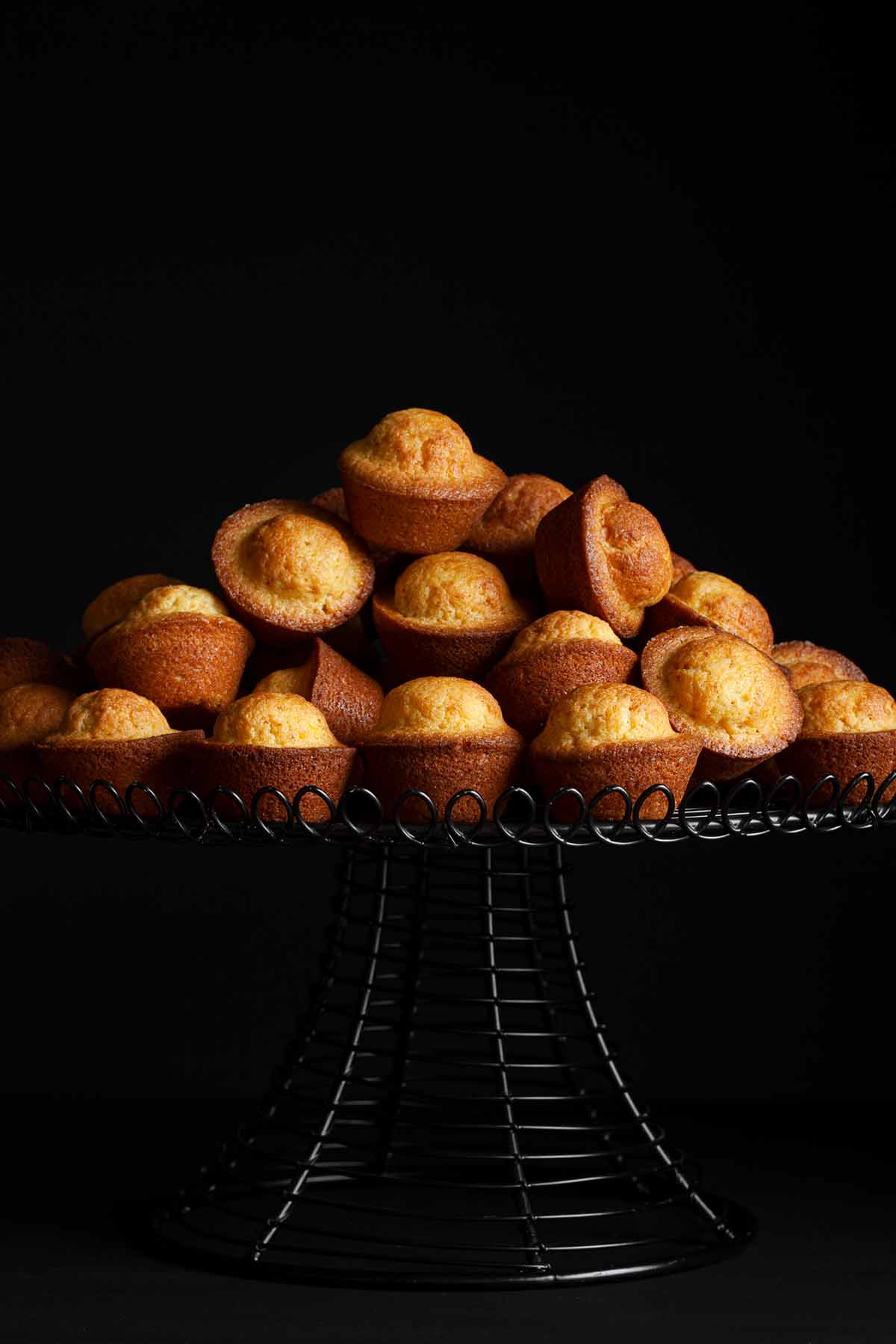
Queques are mini Portuguese cakes that can be flavored with most anything: vanilla, lemon, orange — even savory bits such as chicken, chouriço, or presunto. I’ve never been a big fan of them; I find them either a bit dry, too firm, or overly sweet.
But on one visit to Portugal, The One and I stayed at a small hotel in the walled town of Évora, where citrusy queques were served as part of breakfast. What a revelation. They were buttery, with soft insides and crispy edges. They were so good they were giving the Portuguese custard tarts a run for their money.
I asked the chef for the recipe, which he was happy to oblige. But it soon became clear that some recipes don’t always translate. Determined, I made batch after batch after batch until I approximated what he serves his justly fawning clientele.
Atenção
These mini cakes should be eaten warm from the oven. Even though they’re perfect for dunking—especially in tea—they can lose some of their appeal overnight. Refresh the queques in a warm oven for 10 minutes.
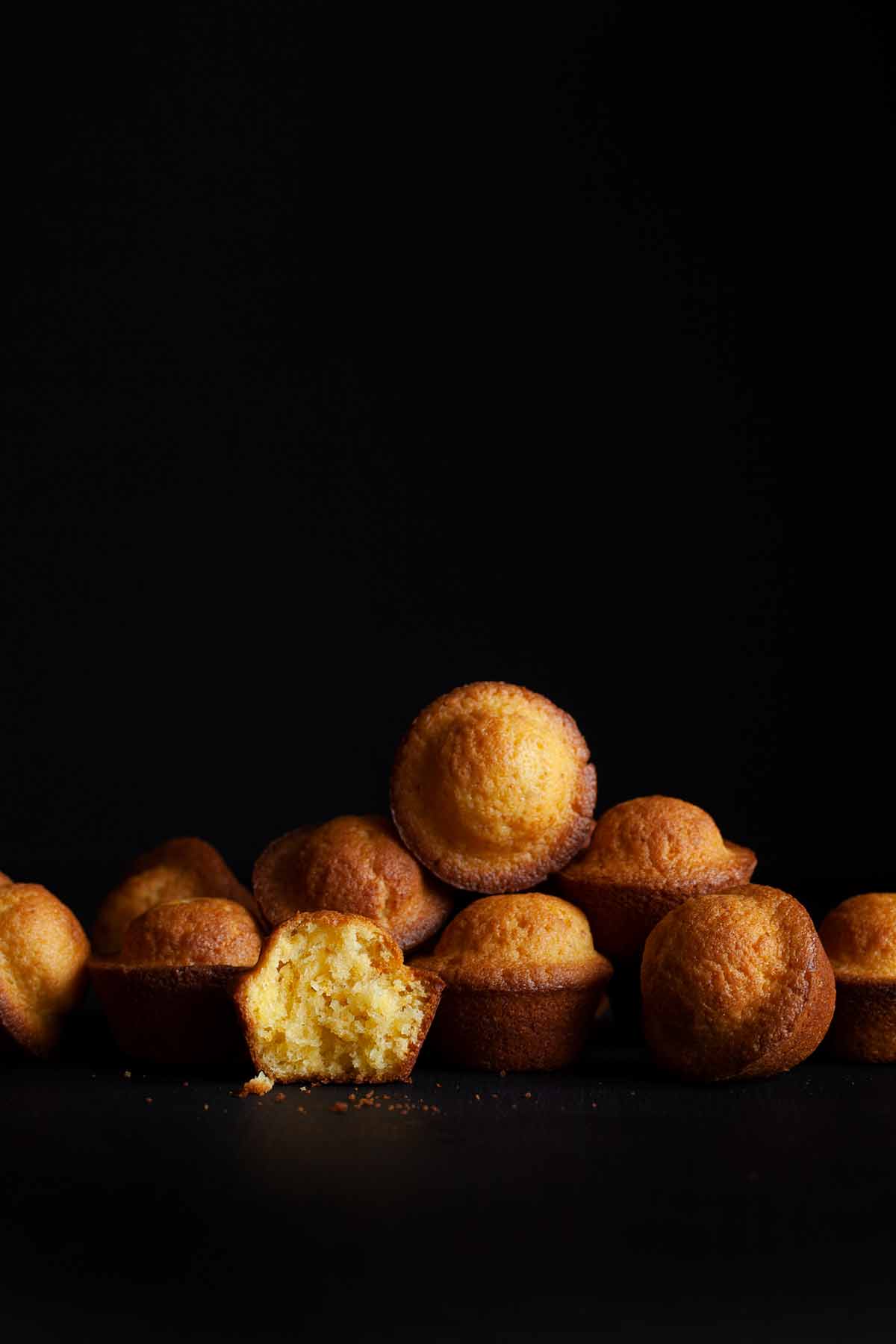
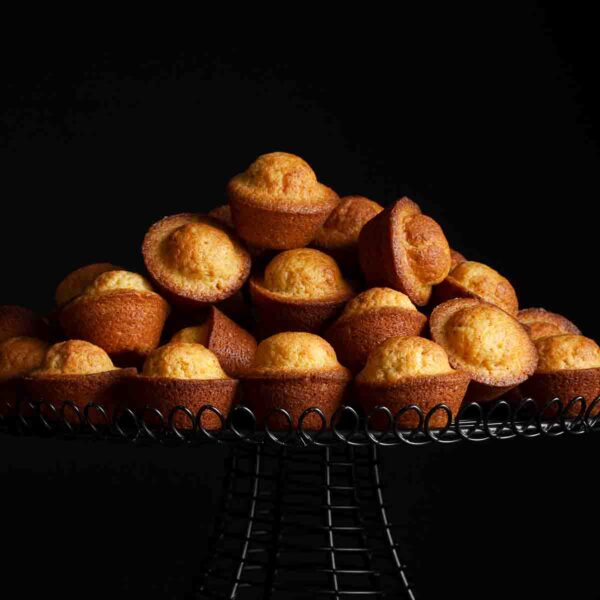
Portuguese Mini Lemon-Orange Cakes ~ Queques
Ingredients
- 12 tablespoons (6 oz) unsalted butter, plus more for greasing the pans
- 2/3 cup milk
- 1 tablespoon grated lemon zest
- 1 tablespoon grated orange zest
- 3/4 cup granulated sugar
- 1 1/2 cups all-purpose flour
- 2 teaspoons baking powder
- 1/4 teaspoon kosher salt
- 1 large egg plus 1 large egg yolk, whisked
- 1/4 teaspoon pure vanilla extract
Instructions
- Position the rack in the middle of the oven and crank the heat to 400°F (200°C). Brush two 12-well mini-muffin tins (1 3/4-by-7/8-inch) with butter. Set aside.
- Heat the milk and butter in a small saucepan over low heat until the butter is melted. Remove the pan from the stove and let the mixture cool until warm.
- In a large bowl, rub the lemon and orange zests into the sugar with your fingers until fragrant.
- Dump in the flour, baking powder, and salt and whisk to combine.
- Stir the egg, yolk, and vanilla into the warm milk mixture and then pour it into the flour mixture in several additions, stirring gently until the ingredients are just incorporated and the batter is smooth.
- Spoon the batter into the prepared pans, three-quarters full. Bake until the cakes are well-risen and golden brown, 18 to 20 minutes.
- Transfer the pans to a rack, cool for 5 minutes, and then pop out the mini cakes. Serve warm piled high in a napkin-lined basket or large cake stand.

An LC Original
View More Original RecipesNutrition
Nutrition information is automatically calculated, so should only be used as an approximation.
Recipe Testers’ Reviews
These Portuguese mini cakes shine bright in their simplicity. Perfectly domed and tender-crumbed, buttery with a nuanced hint of citrus and vanilla, they are refined and unpretentious at the same time. Do serve them warm while the edges are slightly crispy—biting into them to reveal the soft interior is addictive. (Settle down with a basket of them on a Netflix night. Like fresh popcorn, these lovelies would not last a movie, just FYI.)
Even better, the recipe is as simple and straightforward as the cakes. The batter took just a few minutes to mix, and it came together, smooth and lump-free, with only a rubber spatula.
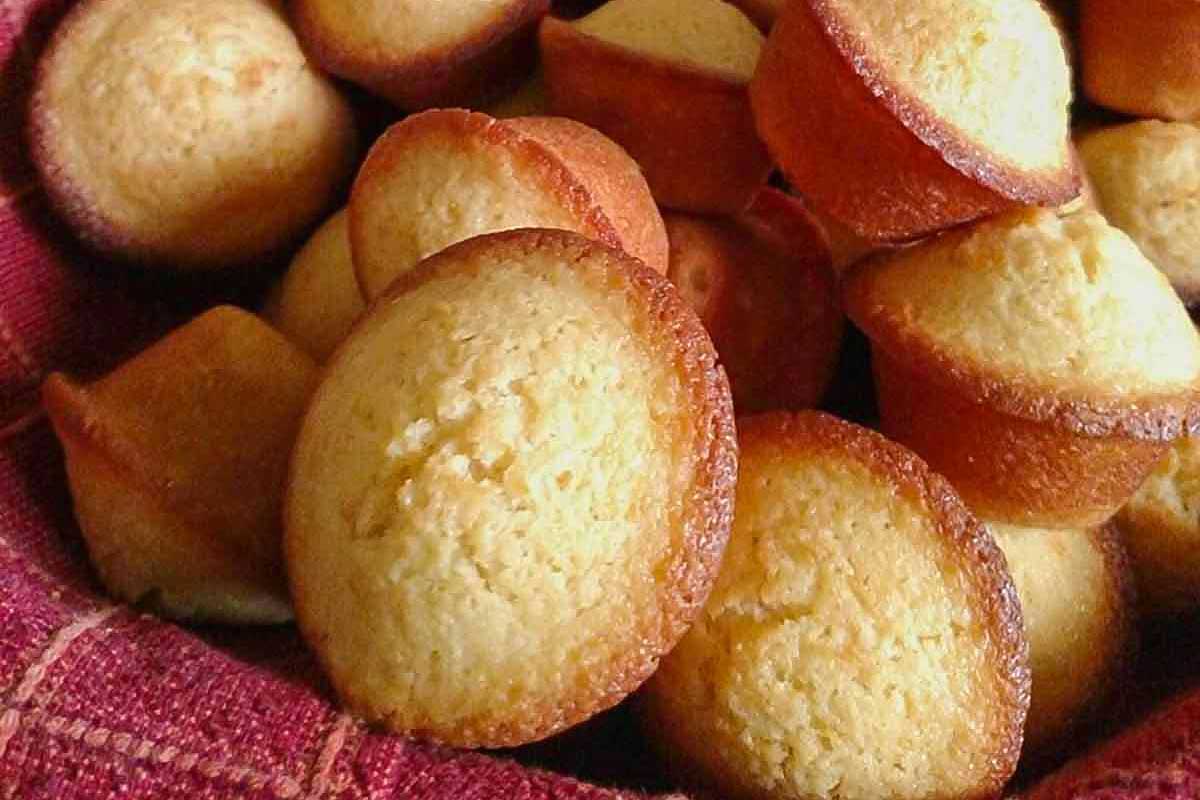
One word for these queques: yummy! I love citrus, and this recipe didn’t disappoint. These cakes were quick and easy, and didn’t call for any unusual ingredients or require any special equipment.
For these Portuguese mini lemon-orange cakes, I used one of my 24 cup mini-muffin tins and my #70 cookie scoop to fill the cups. I slightly mounded the dough and it was the perfect amount to fill my pan. My cakes were done at 18 minutes, and after cooling for 5 minutes, they came right out of the pan.
The crunchy edges and light but distinct citrus flavor was just right. I’ll be making this recipe again.
These Portuguese mini cakes are delicious. They are quick and easy to make and use common ingredients that one would already have in the house.
The recipe also lends itself to variations by using other flavor zest (like grapefruit, lime) or changing the vanilla extract to coconut, for example. I might also add one-third of a cup of lemon yogurt or sour cream to the batter if I made them again to enrich the batter.
These modest little Portuguese queques are the perfect treat with afternoon coffee or tea, delicious and fragrant and really quite cute. They are lightly sweet and not overly indulgent, so you can enjoy them any time guilt free. Think muffin rather than cake.
I divided the recipe in half which yielded 16. Perhaps not all mini muffin tins are uniform in size. In any event, it really doesn’t matter as long as you do not overfill them beyond three-quarters full and keep an eye on the baking time. I knew mine were done at 17 minutes when they were golden brown and a tester came out clean. The usual problem of dividing recipes with 1 egg was easily solved by whisking together the whole egg plus 1 yolk. I then weighed the total and divided in half. Unless you have a large group, I would advise only making half a batch as they are best served warm from the oven, and did not hold up so well overnight.
Although they are perfect as is, I couldn’t resist serving these with a little smear of delicious tangy Meyer lemon marmalade from this very website.
Allow about 3 to 4 per person.
Absolute perfection! The perfect (for lack of a better word) little snack to have with your morning coffee, a light dessert with tea or anytime really just because they are so darn good. My favorite is warm right out of the oven. Not overly sweet, the perfect amount of citrus, the moistest and tenderest cake ever, and it fits perfectly in your hand.
This recipe couldn’t be more forgiving or come together any easier. They came out perfectly browned, moist, flaky, and delicious. They’re deceptively simple to make and the directions are fool-proof.
These Portuguese mini lemon-orange cakes were tiny, addicting bites of citrusy goodness. With so few ingredients, they came together very quickly—zesting the citrus was probably the most involved part of the recipe. I used one huge orange and two small lemons to get the required amount of zest. Our cakes were perfectly baked in 11 minutes.
We sampled the queques warm, and indeed they were best while still warm, however, we also ate some of them at room temperature and enjoyed them that way as well. I had a bit of batter left and made one giant cake in a 4 oz ramekin (cooked in around 23 minutes).
I initially made these in the morning, and they were delicious as a brunch component with a cup of tea, though we ate leftovers as snacks and dessert, so we felt confidant that these little cakes are perfect any time of the day.
These cute little cakes baked up moist and fluffy with a tender crumb and had a wonderful not too sweet citrusy flavor. So good, but be forewarned, you can’t stop at eating just one!!!
My little cakes, however, didn’t have the pretty domed tops as in the photo. While baking the first 8 minutes, the sides really rose up tall, but the middles appeared sunken, so I was a little worried. But by the 17-minute mark, the middles had risen almost to the now very golden edges, and the middles looked dry, so I tested the centers with a toothpick and they were done. After cooling for 5 minutes, they popped out easily from the muffin tins. I filled 30 mini-muffin wells from this batter.
The next time I make these, I’ll try baking them at 375°F to see if they bake more evenly. They will then probably take the full 20 minutes baking time at this temperature. But whether they dome or not, it really doesn’t matter to us since they tasted so good. They would make such lovely little book club treats, and if I can’t get them to dome nicely, I’ll just pipe the tops with lemon and/or orange curd and finish them off with mint sprigs.
It’s hard to tell the exact number of servings from this yield of 30 mini cakes, since they go down pretty easily. This one’s a keeper!
These mini cakes are tender, fragrant and packed with fresh citrus flavor. I enjoyed learning a new technique—rubbing the lemon and orange zest with the sugar to release flavor and beautiful aroma. I will use this method in other recipes.
They stir up super easy and baking produced a nice crown. I drizzled them with a light glaze of powdered sugar, orange juice, and the bit of leftover orange and lemon zest. These would be delicious for brunch, afternoon tea, or light dessert with fresh fruit.
Don’t be deceived by the simple appearance of these queques. They are packed with citrus flavor and they smell delightful. Even better—the recipe uses easy-to-find ingredients and comes together quickly and easily.
I will definitely be making these again but with two changes: 1. After preheating my oven, I will flip steps 1 and 2 (that way my milk/butter mixture can be cooling while I prep my pan) and 2. I will check the cakes at 17 minutes. I baked my cakes for 18 minutes and found them to be just a touch over done.
Tip: Take the time to butter your muffin tins well. I did and the muffins came out easily. We stored the cakes at room temperature in a sealed container and enjoyed them with a pat of cold salted butter on them. Yum!
I cannot get enough of these Portuguese mini lemon-orange cakes! They are mini, fluffy, clouds of deliciousness. These cakes have a delicate crumb with specks of zest coming through. The batter came together easily and once in the oven, my kitchen smelled amazing of baked goodness.
I used a miniature cookie scoop to scoop the batter into the muffin tins. These yielded 2 and a half dozen for me. One note to mention, I used 2 muffin pans. The stainless steel pan yielded cakes cooked perfectly to a golden brown in 19 minutes. The darker, non-stick pan yielded dark brown cakes in only 15 minutes.
These mini cakes, while still delicious, were not the fluffy clouds I mentioned above; they had a crunchy outside with a soft center, slightly denser and without as much rise as the cakes using the stainless steel pan. The cakes using the stainless steel pan won my heart; they rose beautifully and were not dense in the least.
They were perfect shortly after baking while still warm. Also, they were fantastic in the morning with a dollop of butter and a cup of coffee. And of course, these served as a midday treat. We will enjoy these again and again!
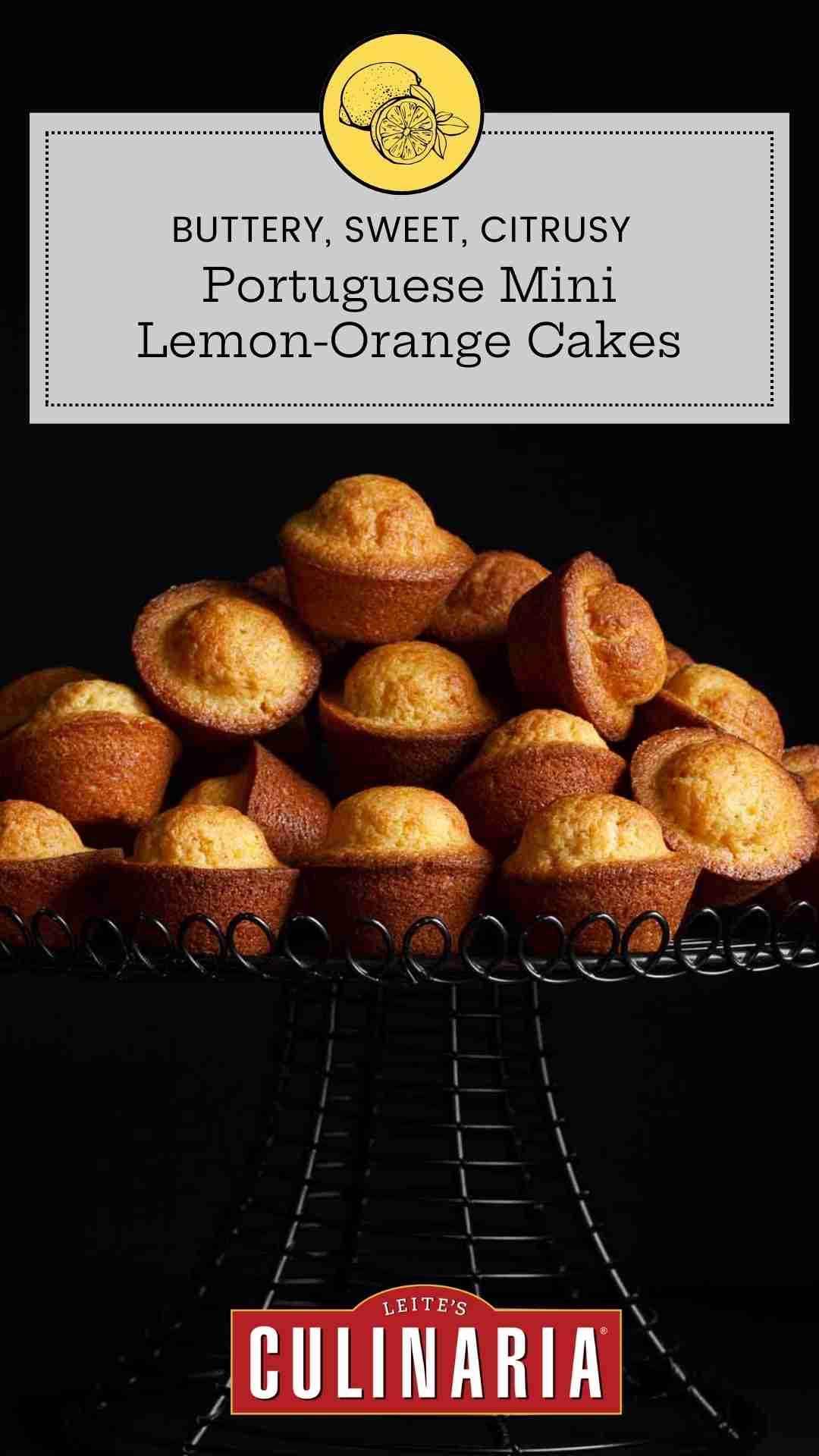
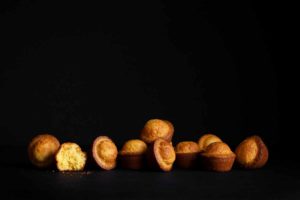













Our absolute favorite!! The taste is subtle, buttery, and completely addictive! We LOVE these!! I sub gluten-free measure for measure flour and use almond milk, and they come out excellently! They have an old-world simplicity. I highly recommend this his recipe.
Mary, that sounds divine! I’m thrilled you made it your own.
It’s near frigid here in New England. I would like to make queques to accompany chicken soup. I was thinking herb and bits of onion. I’m not a chef. Cheese? Any suggestions? Can’t wait to try these!
Jenny
Jenny, I admire your ambition! And your idea sounds wonderful. The problem is this is a sweet treat. You’d have to remove the sugar, which does a lot chemistry-wise to make this little cake a success. What I suggest is perhaps trying one of our biscuit recipes. You could make these cheddar and ham biscuits and add some cooked diced onions.
This is the best “Queques” recipe I have baked and they are just as good if not better that the ones you get at most bakeries in Portugal. Simple instructions and perfect results. Thank you!
You’re welcome, Carlos! Thank you for taking the time to comment. They look wonderful.
Carlos, those are fantástico! Incrível! You are most welcome!